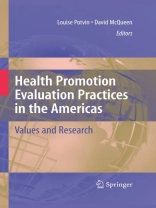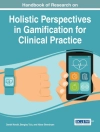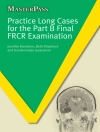More and more, health promotion is a crucial component of public health, to the extent that public health interventions are called on to prove their effectiveness and appraised for scientific validity, a practice many in the field consider self-defeating. Health Promotion Evaluation Practices in the Americas cogently demonstrates that scientific rigor and the goals of health promotion are less in conflict than commonly thought, synthesizing multiple traditions from countries throughout North, Central, and South America (and across the developed-to-developing-world continuum) for a volume that is both diverse in scope and unified in purpose.
The book’s examples—representing robust theoretical and practical literatures as well as initiatives from Rio de Janeiro to American Indian communities—explain why health promotion evaluation projects require different guidelines from mainstream evaluative work. The editors identify core humanitarian principles associated with health promotion (participation, empowerment, equity, sustainability, intersectoral action, multistrategy, and contextualism), while chapters highlight challenges that must be mastered to keep these principles and scientific objectives in sync, including: (1) Building health promotion values into evaluation research projects. (2) Expanding the use of evaluation in health promotion. (3) Developing meaningful evaluation questions. (4) Distinguishing between community-based participation research and evaluation-based participation. (5) Evaluating specifically for equity. (6) Designing initiatives to foster lasting social change.
The applied knowledge in Health Promotion Evaluation Practices in the Americas: Values and Research can bring the goals of intervention into sharper focus for practitioners, evaluators, and decision-makers and facilitate communication on all sides—necessary steps to progress from study findings to real-world action.
Inhoudsopgave
Health Promotion Evaluation in the Americas.- Health Promotion in the Americas: Divergent and Common Ground.- Practical Dilemmas for Health Promotion Evaluation.- Issues in Health Promotion Evaluation: Fitting Evaluation Practice to Health Promotion.- Developing Evaluation Questions: Beyond the Technical Issues.- There Is More to Methodology than Method.- A Realist Approach to the Systematic Review.- From Knowledge to Action: Challenges and Opportunities for Increasing the Use of Evaluation in Health Promotion Policies and Practices.- Aligning Evaluation with Health Promotion Principles: Experiences from the Americas.- Figurative Thinking and Models: Tools for Participatory Evaluation.- Dilemmas in Health Promotion Evaluation: Participation and Empowerment.- Formative Evaluation and Community Empowerment Among American Indian/Alaska Natives.- Intersectoral Approaches to Health Promotion in Cities.- The Participatory Evaluation of Healthy Municipalities, Cities and Communities Initiatives in the Americas.- Evaluating Health Promotion in Rio de Janeiro, Brazil: An Integrated Local Development Project.- Multi-strategy in the Evaluation of Health Promotion Community Interventions: An Indicator of Quality.- The Contribution of A Systematization Evaluative Approach to Implement A Health Promotion Project in Capela do Socorro, Sao Paulo, Brazil.- Issues in Evaluating Equity.- Context as a Fundamental Dimension of Health Promotion Program Evaluation.- Conclusion.- Aligning Evaluation Research and Health Promotion.- Aligning Evaluation Research and Health Promotion Values: Practices from the Americas.
Over de auteur
Louise Potvin has a doctorate in Public Health. She is professor at the Department of Social and Preventive Medicine, Universite de Montreal and researcher at the Interdisciplinary Health Research Group. She holds the CHSRF/CIHR Chair on Community Approaches and Health Inequalities, which aims at documenting how public health interventions in support of local social development contribute to the reduction of health inequalities in urban settings. Her main research interests are the evaluation of community health promotion program and how local social environments are conducive of health. She was a member of the WHO Working Group on the evaluation of health promotion.












